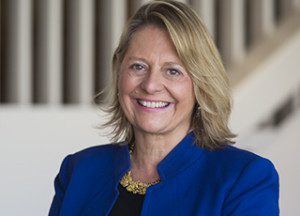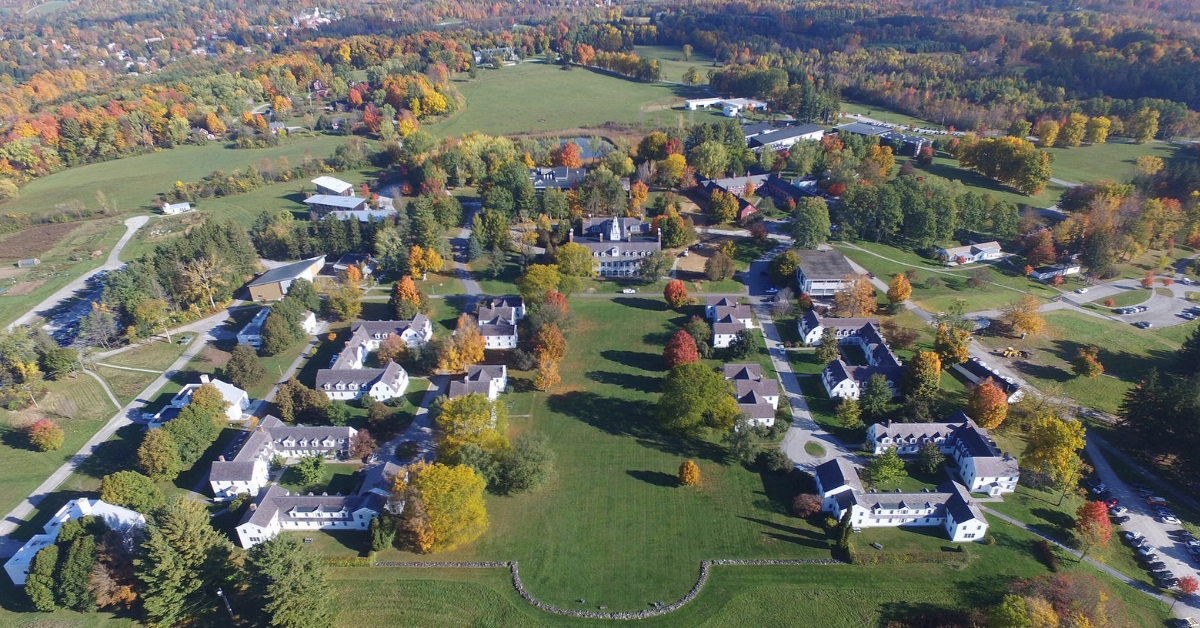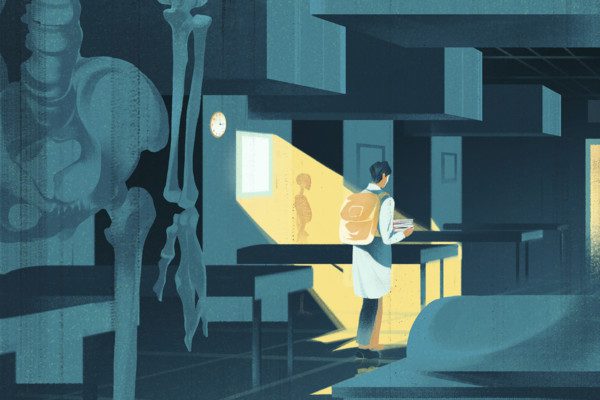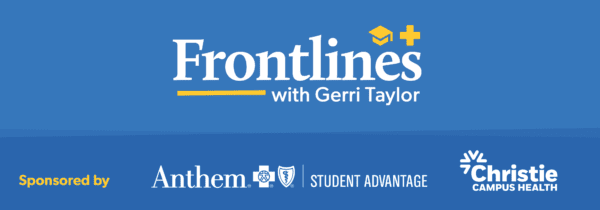
Laura Walker, President of Bennington College
Laura Walker did not set out to be a college president though the decades she spent in public media may have prepared her well for the job. The former president and CEO of New York Public Radio says her primary mission has always been in alignment with the one she helped articulate at NYPR: “to make the mind more curious, the heart more open, and the soul more joyful.” In many ways, these same goals are the underpinnings of the “Bennington College Mental Health and Wellness Initiative” – a process and a plan for campus-wide wellbeing that Walker launched soon after becoming president of Bennington College.
“I was thinking about what the opportunities were and what our responsibility as a college is and I thought ‘How can we take this real deep need, here and across the country, and address it at this small, nimble school and produce a model for change that can be shared broadly?,’” said Walker.
By all accounts, Bennington is a good place for deep reflection. Its campus is a mix of traditional and mid-century modern buildings, integrated into a stunning landscape of vast meadows and low mountains. Like a sanctuary or a retreat, the natural environment enhances a rich learning community. Bennington is well known for its non-traditional pedagogy where students direct their own academic path in coordination with faculty/mentors. It is something that drew Walker to the school.
“I loved this idea of a student figuring out who they want to be and what impact they want to have and where their own curiosity will take them and then having the mentors and the support to push them toward those goals,” she said.
Walker’s “aha” moment was applying the same unique approach of the Bennington Academic Plan to student mental health. Bennington’s faculty-supported, self-directed curriculum is now a major component of the school’s Mental Health and Wellness Model, a fully integrated, multi-service, community approach to mental health and wellness that is currently under development. The proposed student wellness plan, like the Bennington Academic Plan, is designed to encourage students to take responsibility for their own growth and development. Working one on one with a professional counseling staff member, students will assess their own wellness needs (both as individuals and as a community member); set goals; identify the available services and resources and monitor their progress in achieving their wellness and mental health goals over time.
A New Model for the Health of the Whole Community
Bennington’s creative culture, together with Walker’s outside-of-academia background, may prove to be the perfect formula for looking at student mental health differently. But the need to do something disruptive around mental health at Bennington was more than just having the right person at the right place. For the last several years, Bennington students have reported higher than average rates of mental health problems; and the campus community was feeling its way through a dramatic demographic shift. The 2019 suicide of an international student and the collective angst of the pandemic contributed to the cumulative distress of the community overall.
“What I heard when I was coming in and talking to students was that they felt really supported in the work they were doing academically but many of them were really struggling with their mental health,” said Walker. “And when I talked to faculty, they said, ‘We see something happening here where students are coming to us with mental health issues, and questions about how to navigate this ambitious and also challenging process that is Bennington and we don’t have the skills to help them.’”
Walker brought in a thought partner from her previous work to oversee an effort to better understand and address what she was hearing. Dr. Michael Cohen is a developmental psychologist who uses qualitative and quantitative research to help organizations achieve objectives like repositioning and major change. He and Walker worked together in Walker’s early days in public television designing programming for the Children’s Television Workshop. Cohen is a big thinker who describes his work as “pursuing the deepest possible understanding of why individuals act the way they do.”
Cohen led a multi-component effort at Bennington that included a needs assessment, a landscape review, and outside expert advice. The last component involved a day-long mental health convening with administrators and behavioral health experts from around the country that served a number of purposes. It provided what Cohen called, “valuable free advice.” It energized the campus around this issue (Cohen says “Demonstrating that you are addressing the problem is part of the change”) and it put Bennington on the map as a national thought leader in college student mental health.
In the needs assessment and landscape review, Cohen dug deep into the mental health terrain at Bennington, conducting over a hundred interviews with students, alumni, faculty, and other campus stakeholders, and reviewing and analyzing years of survey findings. One obvious outlier was the increasing number of Bennington students who report having an acknowledged mental health condition. Almost two-thirds (61%) of the 189 students responding to an internal Spring 2020 survey reported at least one diagnosed/treated mental health condition. This is compared to 35% of U.S. post-secondary students who reported a diagnosed mental health condition in a 2019 Boston University study. These ratios made for high utilization of Psychological Services. 83% of first year students indicated there was either “some chance” (45%) or a very good chance (38%) that they would choose to seek counseling from the college’s mental health services.
Cohen theorizes that what is behind these statistics is the fact that teens and young adults tend to be over-diagnosed, driven by a reimbursement model that calls for an acknowledged diagnosis. This early labeling can lead to what he describes as naive expectations, on the students’ part, about mental health treatment. “What I found was that students were very proactive in their creative, intellectual lives, but very reactive in terms of their mental health,” he said. “Their thinking was ‘I have this problem. You need to fix it.’”
Another major influence in the current campus climate at Bennington is the major shift in the make-up of its student body. Between 2012 and 2019, the percentage of international students and domestic students of color enrolled at Bennington increased from 22% to 42 %. Cohen has relayed, “The transformation to a racially, economically, and internationally diverse institution has created an enormous and as-yet unresolved challenge to the institution’s traditional emphasis on student independence and self-direction, leaving various student subgroups feeling frustrated, minoritized and underserved.”
“In psychology, we talk about the unit of analysis and it became clear that the mental health and wellness needs of both individuals and the community as a whole needed to be addressed.” The needs assessment and resultant plan identifies strategies that address the specific needs of all groups including strengthening assets that were underutilized. Cohen’s report looks at everything from providing more academic support to bolster the student driven-curriculum to encouraging physical activity at a school that has no organized sports to making room for religion for students who practice their faith.
There were needed changes in Psychological Services, now called Counseling and Psychological Services (CAPS). Kat Daley, the new Director of CAPS, described the problems associated with an old model in a dramatically new environment.
“We had one default which was to offer individual therapy,” she said. “Anything that came up for a student, whether identified by an academic advisor or faculty or just self-referred, they would walk down the hill to the office and when they got to us, they’d be plugged into traditional therapy, regardless of culture, insurance issues, background or actual request. And this was in no way meeting the needs of the entire community.”
Students of color, international students, first generation and low-income students and LGBTQ+ students reported feeling uncomfortable with seeking counseling services, creating a treatment gap within the Bennington student population. In Cohen’s report, he cites a number of barriers to mental health services in addition to the one-size-fits-all approach. There was little understanding, as well as misconceptions, about how to access counseling services. Low-income students without insurance were either unaware that they could apply for a waiver form to reduce fees for service or they found the process degrading, impacting their willingness to seek services.
The new plan calls for a major overhaul of the way mental health services are delivered by CAPS, with a wider range of treatment modalities and interventions; additional, diverse staff; and greater focus on prevention. A new reimbursement model will allow all students to receive a limited number of counseling sessions. Accountability for wellness will be infused into the whole campus through a wellness model taskforce made up of an accurate representation of the student body, faculty, administrators and staff. A current credited class this fall, “Wellbeing at Bennington”, is being co-taught by Daley and Ali Tartaglia, the Director of Wellness, to create a wellness model specific for the campus by Bennington students.
“We needed environmental, cultural changes because just sending students down the hill to discuss the ways they’re being micro-aggressed every day was not going to solve this problem,” said Daley.
Focusing on the needs of underserved students is also part of the new Bennington Student Wellness Plan. While modeled on the student-centered design of the Bennington Academic Plan, the wellness plan acknowledges the need to better support students in understanding what is available to them and mentoring them within a broader wellness domain. The proposed pilot for the model, includes students attending credited classes in Mental Health and Wellness and receiving regular one-on-one guidance and support from a professional counselor to maintain an ongoing record of their progress in achieving their wellness and self-development goals. Program implementation will require hiring or reassigning designated faculty or staff members to develop and teach the wellness curriculum.
The goal is for it to be fully offered to all students in the coming years, ensuring that every Bennington student has adequate orientation to the basic concepts and various dimensions of student wellness. Many of the Plan’s components are already underway and Walker and her team are content that it is evolving at the pace of the community. Daley says she is already seeing changes on campus that are playing out “in a very Bennington kind of way.” Students are holding circle spaces which allow them to come together to talk and learn to listen. Often, faculty and staff will join in.
As slow change makes its way through campus, Walker is eager to share what they’ve learned at Bennington. Documentation is built into the Plan and Walker hopes to work alongside other schools to create best practices. She encourages institutions to take hard steps like looking wide-eyed at the challenges they have and listening to outside experts, advice more likely to come from an entrepreneur than an administrator. “I have never thought that the best answer to what we should do is to look at what we’ve done in the past,” she said.




